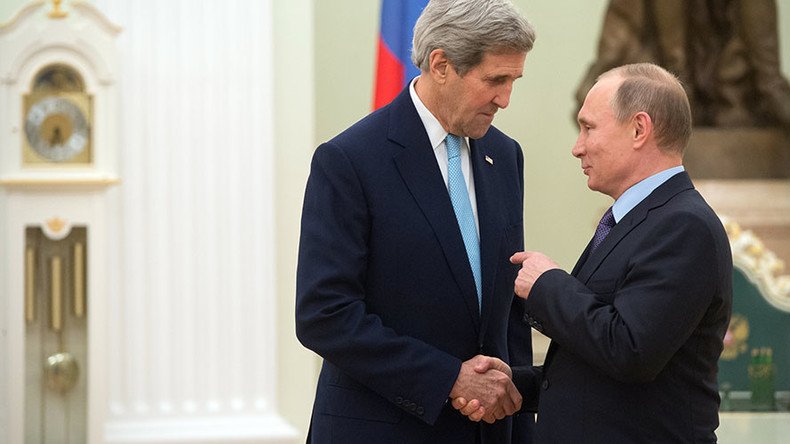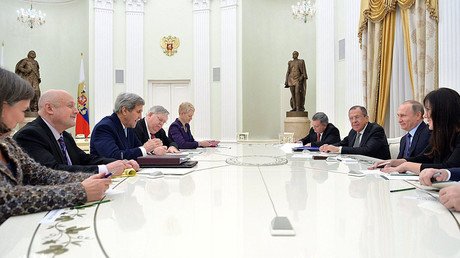‘Washington has gone from ‘regime change’ to ‘political transition' in Syria, but we are not stupid’

It is a good sign that John Kerry visited Moscow and had high-level meetings, but we must remember that US foreign policy will not change on a dime, said Daniel McAdams, Executive Director of the Ron Paul Institute for Peace and Prosperity.
RT: Washington appears to be backing away from previous calls to isolate Russia... What is behind the apparent change in policy?
Daniel McAdams: I think, first of all, diplomacy is always good. It is a very good sign that John Kerry actually went to Moscow, made the effort to go out there and had these high-level meetings. I think it is something very positive. However, I don’t want to get ahead of ourselves here because policy doesn’t change on a dime. But what is the reason for this apparent shift, I think the facts on the grounds have changed in places like - particularly - Syria.
Russia was very assertive several months ago and they literally changed the situation. The US was not counting on Russia being so assertive. They were well into the stages of planning a ‘no-fly zone’ which would have been a hub for the US-preferred rebels to operate from to continue the US policy - which has not abated - of overthrowing the government of Assad. The Russian move into Syria, based on a bilateral agreement with the Syrian government, has changed the facts on the ground. The aggressive American rhetoric, along with control of the skies and the ground in Syria, ended, and I think Washington took a long time to find its feet. And I think now they might be trying to attract some flies with honey instead of vinegar, as we say here.
Geopolitical analyst Eric Draitser commented on John Kerry’s visit to Moscow: “On the one hand, the Obama administration is backing away rhetorically from the issue of “regime change,” but in practice in terms of its policy and in terms of the larger Washington consensus policy in Syria, regime change still remains very much on the table. While Kerry and Obama can say that they never intended regime change, all of the organs of US foreign policy have been arguing for upping the ante in Syria, moving towards regime change, and they’ve been doing so since 2011.
Even this year, even just in the last few weeks, we have seen influential people in the neocon establishment and in the liberal establishment both talking about the need for regime change, the need for the deconstruction of Syria, its de facto partition into enclaves based along sectarian ethnic lines. We see a clear and unmistakable consensus within the neocon world for that policy and we see the Obama administration continuing to pursue regime change.
I think it is very irresponsible for anybody to assume that because the US is rhetorically making gestures towards a conciliatory process now that somehow it indicates a substantive change in US policy. The only way that anybody can reasonably assume and conclude that the US is genuinely interested in peace is when they drop the regime change language and they come to a negotiated settlement with Russia, with Syria, with Iran, with all of the interested parties and actually bring peace to that war-torn country. The US is the main instigator of the war in Syria along with its regional partners – Turkey, Saudi Arabia and the rest of them. Because of that the US bears a special responsibility to move this dialogue towards peace and until we recognize that, the US will be able to do what it wants”.
RT: How could this affect the US relationship with its allies who oppose Russia, notably Ukraine and Turkey?
DM: There are two schools of thought on what happened with Turkey and the shoot down of the Su-24.One would say that there is no way Turkey would take such a bold move without Washington’s approval and maybe encouragement. The other says that Washington freaked out when Turkey did something so bold and so completely insane and destabilizing. What is the truth, I don’t know, I am not privy to that information. But I would say we shouldn’t get too far ahead of ourselves and think the US is going to abandon Turkey or abandon their grand project in Ukraine, which the head of the National Endowment for Democracy called “the prize”. Let’s not forget that.
Let’s also not forget that Kerry was travelling, although, of course, it’s a mere formality, but he was travelling with Victoria Nuland, one of the strongest Russophobic people in the US government, with Celeste Wallander, who said “Today’s Russia is not the Russia we want,” just a couple of months ago. These people have built a career on an anti-Russian philosophy. If we saw some moves in the US government to isolate some of these people and perhaps replace a few, I might be a little more sanguine about the trip, but I am cautiously optimistic, I would say, overall.
Kerry confused on Moscow streets'Do I want to do what to the Russian people?' - Russian boy just confused Kerry
Posted by RT Play on Tuesday, December 15, 2015
RT: What are the chances of a broader coalition, including the US and Russia, against Islamic State?
DM: I am not sure that’s such a great idea from the US perspective. I think the best US policy in the Middle East is non-intervention, stay out of the affairs, stop trying to decide what the future of the Syrian government should be. The US still has an official policy of regime change, that hasn’t change. Now they are calling it a political transition but we are not stupid, we know what it means. The US has spent the last two years demonizing Russia. It is too early to say that they flipped on a dime. If Russia and Syria agree that they have a relationship that Russia can assist the legitimate Syrian government that is one thing. But for the US to get involved, I think, it is still very dangerous; the best policy for the US is non-intervention.
LISTEN MORE:
The statements, views and opinions expressed in this column are solely those of the author and do not necessarily represent those of RT.













